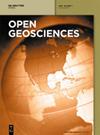Functional typology of settlements in the Srem region, Serbia
IF 1.7
4区 地球科学
Q3 GEOSCIENCES, MULTIDISCIPLINARY
引用次数: 0
Abstract
The development of the functional settlement typology methodology is of academic and practical importance as it incorporates the social, economic, and demographic dimensions of regional development. Rural settlements are seen as a base for labor; traditional urban centers have become a base for commuters, while at the same time, new economic centers are emerging where capital investment is accumulating. This article presents the research conducted in the Srem region (located in the province of Vojvodina) to determine the functional typology of the settlement, which is of social, economic, and demographic importance for the region itself and for Serbia as a whole. This well-known immigration area in Serbia has been inhabited for centuries for its specific economic and political reasons. The very intensive economic activities of the last two decades have been influenced by development investments and contributed to the functional transformation of the settlements. The census data from 2022 make it possible to determine a functional typology of settlements in the Srem region using the factor method (principal component analysis). The article aims to explain the basic characteristics of functional types of settlements and to determine the mechanisms of their territorial distribution, which would be helpful in the future planning and organization of local and regional development of the Republic of Serbia.塞尔维亚斯雷姆地区居住区的功能类型学
功能聚落类型学方法的开发具有重要的学术和实践意义,因为它包含了区域发展的社会、经济和人口层面。农村居住区被视为劳动力的基地;传统的城市中心已成为通勤者的基地,与此同时,新的经济中心正在出现,资本投资正在不断积累。本文介绍了在斯雷姆地区(位于伏伊伏丁那省)开展的研究,目的是确定定居点的功能类型,这对该地区本身乃至整个塞尔维亚都具有重要的社会、经济和人口意义。由于其特殊的经济和政治原因,这个塞尔维亚著名的移民区已经居住了几个世纪。在过去二十年中,密集的经济活动受到了发展投资的影响,促进了居住区的功能转变。根据 2022 年的人口普查数据,可以利用因子法(主成分分析法)确定斯雷姆地区居民点的功能类型。文章旨在解释住区功能类型的基本特征,确定其领土分布机制,这将有助于塞尔维亚共和国未来规划和组织地方和区域发展。
本文章由计算机程序翻译,如有差异,请以英文原文为准。
求助全文
约1分钟内获得全文
求助全文
来源期刊

Open Geosciences
GEOSCIENCES, MULTIDISCIPLINARY-
CiteScore
3.10
自引率
10.00%
发文量
63
审稿时长
15 weeks
期刊介绍:
Open Geosciences (formerly Central European Journal of Geosciences - CEJG) is an open access, peer-reviewed journal publishing original research results from all fields of Earth Sciences such as: Atmospheric Sciences, Geology, Geophysics, Geography, Oceanography and Hydrology, Glaciology, Speleology, Volcanology, Soil Science, Palaeoecology, Geotourism, Geoinformatics, Geostatistics.
 求助内容:
求助内容: 应助结果提醒方式:
应助结果提醒方式:


